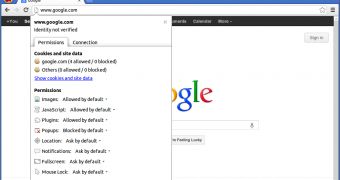Google Chrome 23 is out in the stable channel, it should be coming down the pipes via the automated update system, if it's not already there. The latest major update comes with several new features, though nothing to write home about.
Windows users get hardware accelerated video decoding, which means less power use and better performance especially on underpowered machines.
Everyone else also gets to enjoy the new per-website permissions and quick controls, which should make it a lot easier to both check the permissions of any site and change them.
Under the hood, Chrome 23 also comes with another major component of WebRTC, PeerConnection, but it's not enabled by default so Google isn't advertising it.
"We recently enabled GPU-accelerated video decoding for Chrome on Windows. Dedicated graphics chips draw far less power than a computer's CPU, so using GPU-accelerated video decoding while watching videos can increase battery life significantly," Google said.
"In our tests, the battery lasted 25% longer when GPU-accelerated video decoding was enabled," it added.
While battery performance is great, the other benefit is that the CPU will be left to do other things. While there aren't that many CPUs that can't handle HD video on the market, it's still a problem in some cases.
"You’ll also find it much easier to view and control any website’s permissions for capabilities such as geolocation, pop-ups, and camera/microphone access. This saves you from having to dig through settings pages to find these permissions," Google explained.
All you have to do is click on the favicon next to the URL of the site and a pop-up menu with all the permissions will be displayed.
It's a great way of customizing permissions on a per-site basis, you can set the HTML5 Fullscreen option to be allowed by default for YouTube but not for other sites, you can enable pop-ups for the sites that need them and leave them blocked for all the rest, and so on.
Finally, Chrome 23 also comes with the Do Not Track option. While Do Not Track doesn't do anything for now and the future of the proposed standard is uncertain, thanks to Microsoft, having Google finally on board is a big move.

 14 DAY TRIAL //
14 DAY TRIAL //